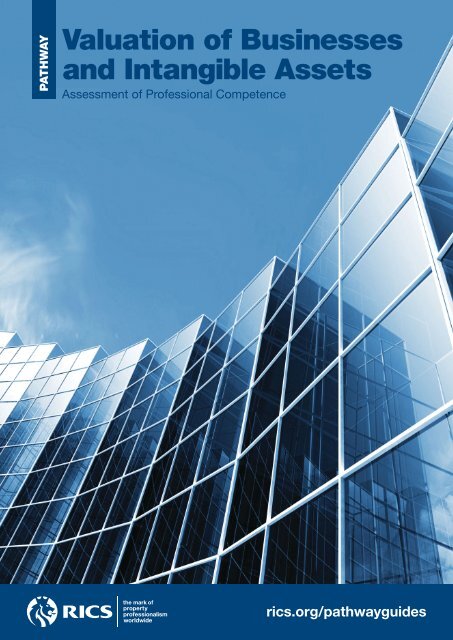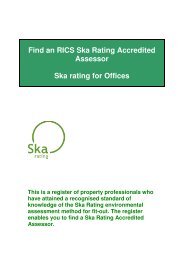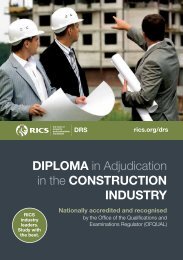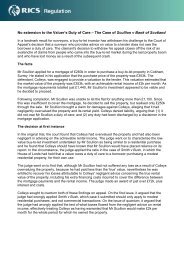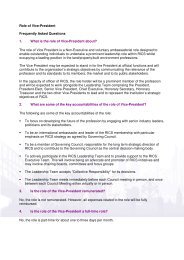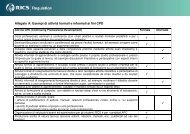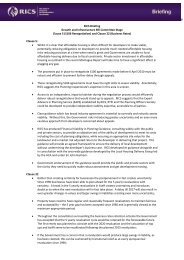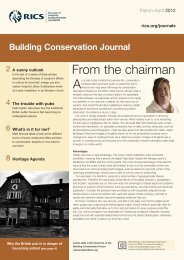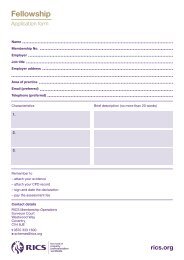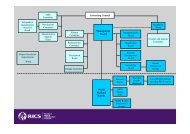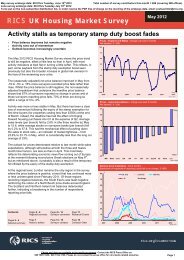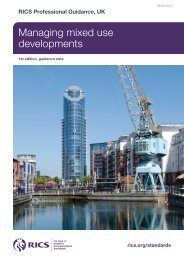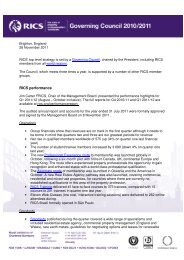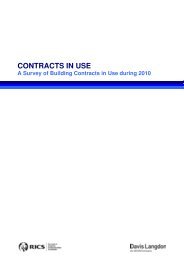RICS Valuation of Businesses and Intangible Assets Pathway Guide
RICS Valuation of Businesses and Intangible Assets Pathway Guide
RICS Valuation of Businesses and Intangible Assets Pathway Guide
Create successful ePaper yourself
Turn your PDF publications into a flip-book with our unique Google optimized e-Paper software.
<strong>Valuation</strong> <strong>of</strong> <strong>Businesses</strong><br />
<strong>and</strong> <strong>Intangible</strong> <strong>Assets</strong><br />
Assessment <strong>of</strong> Pr<strong>of</strong>essional Competence<br />
rics.org/pathwayguides
Published by: <strong>RICS</strong>, Parliament Square, London SW1P 3AD<br />
All rights in this publication, including full copyright or publishing right, content <strong>and</strong> design, are owned by <strong>RICS</strong>,<br />
except where otherwise described. Any dispute arising out <strong>of</strong> this publication is subject to the law <strong>and</strong> jurisdiction<br />
<strong>of</strong> Engl<strong>and</strong> <strong>and</strong> Wales.<br />
02<br />
APC – VALUATION OF BUSINESSES AND INTANGIBLE ASSETS
Contents<br />
Introduction 04<br />
Requirements <strong>and</strong> competencies <strong>of</strong> the APC 06<br />
About Business <strong>Valuation</strong> 11<br />
<strong>Pathway</strong> requirements 12<br />
<strong>Valuation</strong> <strong>of</strong> <strong>Businesses</strong> <strong>and</strong> <strong>Intangible</strong> <strong>Assets</strong> APC 12<br />
Competency guidance 13<br />
Accounting principles <strong>and</strong> procedures (M001) 13<br />
Asset identification <strong>and</strong> assessment (T086) 14<br />
Capital allowances (T008) 15<br />
Compulsory purchase <strong>and</strong> compensation (T011) 16<br />
Corporate finance (T018) 17<br />
Corporate recovery <strong>and</strong> insolvency (T020) 18<br />
Purchase <strong>and</strong> sale (T073) 19<br />
<strong>Valuation</strong> <strong>of</strong> businesses <strong>and</strong> intangible assets (T087) 20<br />
<strong>Valuation</strong> reporting <strong>and</strong> research (T088) 21<br />
Taxation (T089) 22<br />
APC – VALUATION OF BUSINESSES AND INTANGIBLE ASSETS 03
Introduction<br />
About the APC<br />
The <strong>RICS</strong> Assessment <strong>of</strong> Pr<strong>of</strong>essional Competence (APC)<br />
ensures that those applying for <strong>RICS</strong> membership are competent<br />
to practise <strong>and</strong> meet the high st<strong>and</strong>ards required by <strong>RICS</strong>.<br />
There is a wide range <strong>of</strong> pathways available to qualify as an<br />
<strong>RICS</strong> member covering various areas <strong>of</strong> practice, at APC<br />
(Chartered) level.<br />
The APC normally consists <strong>of</strong>:<br />
• a period <strong>of</strong> structured training<br />
• a final assessment.<br />
The structured training is based on c<strong>and</strong>idates meeting a set<br />
<strong>of</strong> requirements or competencies. There is a mix <strong>of</strong> technical,<br />
pr<strong>of</strong>essional, interpersonal, business <strong>and</strong> management skills.<br />
Routes to membership<br />
The following routes lead to chartered membership<br />
(M<strong>RICS</strong>/F<strong>RICS</strong>):<br />
• academic<br />
• graduate route 1, 2 <strong>and</strong> 3<br />
• pr<strong>of</strong>essional experience<br />
• senior pr<strong>of</strong>essional.<br />
All these routes require c<strong>and</strong>idates to complete an Assessment<br />
<strong>of</strong> Pr<strong>of</strong>essional Competence (APC).<br />
Full details <strong>of</strong> the requirements for all routes to membership<br />
are available from:<br />
www.rics.org/careerseducation<strong>and</strong>training/<br />
Qualificationroutes/become_member.htm<br />
How to use this guide<br />
This guide is designed to help you underst<strong>and</strong> more about<br />
qualifying as an <strong>RICS</strong> member using the pathway: <strong>Valuation</strong><br />
<strong>of</strong> <strong>Businesses</strong> <strong>and</strong> <strong>Intangible</strong> <strong>Assets</strong>. The guide is based<br />
on generally accepted practice amongst the business <strong>and</strong><br />
financial valuation community <strong>and</strong> has been designed to<br />
be suitable for c<strong>and</strong>idates globally, <strong>and</strong> across a broad<br />
range <strong>of</strong> specialisms.<br />
04<br />
APC – VALUATION OF BUSINESSES AND INTANGIBLE ASSETS<br />
About Business <strong>Valuation</strong> – provides information on this<br />
area <strong>of</strong> practice with a general overview <strong>of</strong> the <strong>Valuation</strong><br />
<strong>of</strong> <strong>Businesses</strong> <strong>and</strong> <strong>Intangible</strong> <strong>Assets</strong> pathway.<br />
<strong>Pathway</strong> requirements – lists the technical competencies<br />
required <strong>of</strong> the <strong>Valuation</strong> <strong>of</strong> <strong>Businesses</strong> <strong>and</strong> <strong>Intangible</strong><br />
<strong>Assets</strong> APC pathway.<br />
Competency guidance – describes the main technical<br />
competencies associated with business valuation practice,<br />
providing exp<strong>and</strong>ed sector specific guidance on each <strong>of</strong><br />
them. This forms the main part <strong>of</strong> the guide.<br />
NOTE: Please use this guide in conjunction with:<br />
(1) <strong>Guide</strong> for supervisors, counsellors <strong>and</strong> employers<br />
– graduate route to membership, July 2006;<br />
(2) <strong>RICS</strong> Pr<strong>of</strong>essional Experience Applicant H<strong>and</strong>books.<br />
Both <strong>of</strong> these may be downloaded from the <strong>RICS</strong> website:<br />
www.rics.org
Introduction<br />
About the competencies<br />
The APC aims to assess that you are competent to carry out<br />
the work <strong>of</strong> a qualified business valuer. To be competent is to<br />
have the skill or ability to perform a task or function. The <strong>RICS</strong><br />
competencies are not just a list <strong>of</strong> tasks or functions, but are<br />
also based upon attitudes <strong>and</strong> behaviours. The competencies<br />
have been drawn up in a generic way so that they can be<br />
applied globally <strong>and</strong> to different areas <strong>of</strong> practice. This guide<br />
is designed to help you interpret these competencies within<br />
the context <strong>of</strong> business valuation practice.<br />
The competencies are defined at three levels <strong>of</strong> attainment<br />
<strong>and</strong> each APC pathway has its own specific combination <strong>of</strong><br />
competencies that you must achieve at the appropriate level.<br />
You must reach the required level by logical progression <strong>and</strong><br />
in successive stages:<br />
Level 1 – knowledge <strong>and</strong> underst<strong>and</strong>ing<br />
Level 2 – application <strong>of</strong> knowledge <strong>and</strong> underst<strong>and</strong>ing<br />
Level 3 – reasoned advice <strong>and</strong> depth <strong>of</strong> technical knowledge.<br />
The competencies are in three distinct categories:<br />
M<strong>and</strong>atory competencies – the personal, interpersonal,<br />
pr<strong>of</strong>essional practice <strong>and</strong> business competencies common<br />
to all pathways <strong>and</strong> compulsory for all c<strong>and</strong>idates. These are<br />
explained in more detail in the next section.<br />
Core Competencies – the primary technical competencies<br />
<strong>of</strong> your chosen pathway. Certain m<strong>and</strong>atory competencies<br />
may also appear on the core competency list <strong>and</strong> c<strong>and</strong>idates<br />
are asked to select these at a higher level. These are identified<br />
<strong>and</strong> explained in later sections.<br />
Optional competencies – a set <strong>of</strong> competencies selected by<br />
the c<strong>and</strong>idate from a list <strong>of</strong> defined criteria for the particular<br />
pathway. In most cases there is an element <strong>of</strong> choice. These<br />
are mostly technical competencies. These are identified <strong>and</strong><br />
explained in later sections.<br />
Choosing your competencies<br />
It is important that you give careful thought to your choice<br />
<strong>and</strong> combination <strong>of</strong> competencies. Your choice will inevitably<br />
reflect the work you do in your day-to-day environment<br />
(driven by the needs <strong>of</strong> your client/employer). Your choice<br />
<strong>and</strong> combination <strong>of</strong> competencies will be a reflection <strong>of</strong><br />
your own judgement. At the final assessment interview,<br />
the assessors will take these choices into account.<br />
They will expect you to present a sensible <strong>and</strong> realistic<br />
choice that reflects the skills needed to fulfil the role<br />
<strong>of</strong> a competent business valuer.<br />
This guide should help c<strong>and</strong>idates <strong>and</strong> employers select<br />
the competencies that are most appropriate to their<br />
area <strong>of</strong> practice.<br />
How to find help<br />
<strong>RICS</strong> has a fully trained Contact Centre team who will<br />
be able to help you with any general APC queries:<br />
t +44 (0)870 333 1600<br />
f +44 (0)20 7334 3811<br />
contactrics@rics.org<br />
www.rics.org<br />
APC – VALUATION OF BUSINESSES AND INTANGIBLE ASSETS 05
Requirements <strong>and</strong> competencies <strong>of</strong> the APC<br />
The m<strong>and</strong>atory competencies<br />
All c<strong>and</strong>idates, on all routes <strong>and</strong> all pathways, must<br />
achieve the defined level <strong>of</strong> the m<strong>and</strong>atory competencies.<br />
These competencies are a mix <strong>of</strong> pr<strong>of</strong>essional practice,<br />
interpersonal, business <strong>and</strong> management skills that<br />
are considered common to, <strong>and</strong> necessary for all <strong>RICS</strong><br />
pr<strong>of</strong>essionals. You must achieve the minimum st<strong>and</strong>ards<br />
as set out below:<br />
Level 3<br />
• Conduct rules, ethics <strong>and</strong> pr<strong>of</strong>essional practice<br />
Level 2<br />
• Client care<br />
• Communication <strong>and</strong> negotiation<br />
• Health <strong>and</strong> Safety<br />
Level 1<br />
• Accounting principles <strong>and</strong> procedures<br />
• Business planning<br />
• Conflict avoidance, management<br />
06<br />
<strong>and</strong> dispute resolution procedures<br />
• Data management<br />
• Sustainability<br />
• Teamworking<br />
For the senior pr<strong>of</strong>essional route to membership<br />
the following must also be achieved:<br />
Level 2<br />
• Leadership<br />
• Managing people<br />
• Managing resources (excluding human resources)<br />
Note: An APC pathway may also include one <strong>of</strong> these<br />
m<strong>and</strong>atory competencies. If so it will be shown in the core<br />
or optional list for that pathway <strong>and</strong> will need to be achieved<br />
to a higher level than as a m<strong>and</strong>atory competency.<br />
APC – VALUATION OF BUSINESSES AND INTANGIBLE ASSETS<br />
Alphabetical list <strong>of</strong> m<strong>and</strong>atory competencies<br />
M001 Accounting principles <strong>and</strong> procedures<br />
M002 Business Planning<br />
M003 Client Care<br />
M004 Communication <strong>and</strong> negotiation<br />
M005 Conduct rules, ethics <strong>and</strong> pr<strong>of</strong>essional practice<br />
M006 Conflict avoidance, management<br />
<strong>and</strong> dispute resolution procedures<br />
M007 Data management<br />
M008 Health <strong>and</strong> safety<br />
M009 Sustainability<br />
M010 Teamworking<br />
Additional list <strong>of</strong> senior pr<strong>of</strong>essional<br />
m<strong>and</strong>atory competencies<br />
SP001 Leadership<br />
SP002 Managing people<br />
SP003 Managing resources (excluding human resources)
Requirements <strong>and</strong> competencies <strong>of</strong> the APC<br />
M<strong>and</strong>atory competency definitions<br />
Accounting principles <strong>and</strong> procedures M001<br />
At level 1<br />
Demonstrate knowledge <strong>and</strong> underst<strong>and</strong>ing <strong>of</strong> accounting<br />
concepts <strong>and</strong> the format <strong>and</strong> preparation <strong>of</strong> management<br />
<strong>and</strong> company accounts, including pr<strong>of</strong>it <strong>and</strong> loss statements,<br />
cash flow statements <strong>and</strong> balance sheets.<br />
At level 2<br />
Provide evidence <strong>of</strong> interpretation <strong>of</strong> company accounts<br />
<strong>and</strong> balance sheets in your area <strong>of</strong> practice <strong>and</strong> application<br />
<strong>of</strong> appropriate accounting <strong>and</strong> regulatory st<strong>and</strong>ards.<br />
At level 3<br />
Provide evidence <strong>of</strong> reasoned advice given to clients with<br />
regard to pr<strong>of</strong>it <strong>and</strong> loss statements <strong>and</strong> balance sheets.<br />
Business planning M002<br />
At level 1<br />
Demonstrate knowledge <strong>and</strong> underst<strong>and</strong>ing <strong>of</strong> how<br />
business planning activities contribute to the achievement<br />
<strong>of</strong> corporate objectives.<br />
At level 2<br />
Provide evidence <strong>of</strong> application <strong>of</strong> the principles <strong>and</strong><br />
demonstrate your ability to use the tools <strong>of</strong> business<br />
planning appropriate to your area <strong>of</strong> practice.<br />
At level 3<br />
Provide evidence <strong>of</strong> reasoned advice given to clients<br />
<strong>and</strong> others <strong>of</strong> the principles <strong>and</strong> tools <strong>of</strong> business planning<br />
<strong>and</strong> be able to evaluate your performance <strong>and</strong> outcomes.<br />
Client care M003<br />
At level 1<br />
Demonstrate knowledge <strong>and</strong> underst<strong>and</strong>ing <strong>of</strong> the principles<br />
<strong>and</strong> practice <strong>of</strong> client care including:<br />
• the concept <strong>of</strong> identifying all clients/colleagues/third<br />
parties who are your clients <strong>and</strong> the behaviours that<br />
are appropriate to establish good client relationships<br />
• the systems <strong>and</strong> procedures that are appropriate for<br />
managing the process <strong>of</strong> client care, including complaints<br />
• the requirement to collect data, analyse <strong>and</strong> define<br />
the needs <strong>of</strong> clients.<br />
At level 2<br />
Provide evidence <strong>of</strong> practical application <strong>of</strong> the principles<br />
<strong>and</strong> practice <strong>of</strong> client care in your area <strong>of</strong> practice.<br />
At level 3<br />
Provide evidence <strong>of</strong> reasoned advice given to clients<br />
<strong>and</strong> others.<br />
Communication <strong>and</strong> negotiation M004<br />
At level 1<br />
Demonstrate knowledge <strong>and</strong> underst<strong>and</strong>ing <strong>of</strong> effective<br />
oral, written, graphic <strong>and</strong> presentation skills including<br />
the methods <strong>and</strong> techniques that are appropriate to<br />
specific situations.<br />
At level 2<br />
Provide evidence <strong>of</strong> practical application <strong>of</strong> oral, written,<br />
graphic <strong>and</strong> presentation skills that are appropriate<br />
in a variety <strong>of</strong> situations, specifically including where<br />
negotiation is involved.<br />
At level 3<br />
Provide evidence <strong>of</strong> evaluation <strong>of</strong> your communication<br />
in a variety <strong>of</strong> situations.<br />
Conduct rules, ethics <strong>and</strong> pr<strong>of</strong>essional practice M005<br />
At level 1<br />
Demonstrate knowledge <strong>and</strong> underst<strong>and</strong>ing <strong>of</strong> the role <strong>and</strong><br />
significance <strong>of</strong> <strong>RICS</strong> <strong>and</strong> its functions. Also an appreciation<br />
<strong>of</strong> your personal pr<strong>of</strong>essional role <strong>and</strong> society’s expectations<br />
<strong>of</strong> pr<strong>of</strong>essional practice <strong>and</strong> <strong>RICS</strong> code <strong>of</strong> conduct <strong>and</strong><br />
conduct regulations, including the general principles <strong>of</strong> law<br />
<strong>and</strong> the legal system, as applicable in your country <strong>of</strong> practice.<br />
At level 2<br />
Provide evidence <strong>of</strong> practical application in your area<br />
<strong>of</strong> practice, being able to justify actions at all times <strong>and</strong><br />
demonstrate personal commitment to the rules <strong>of</strong> conduct,<br />
ethics, <strong>and</strong> <strong>RICS</strong> 12 pr<strong>of</strong>essional <strong>and</strong> ethical st<strong>and</strong>ards.<br />
At level 3<br />
Provide evidence <strong>of</strong> application <strong>of</strong> the above in your area<br />
<strong>of</strong> practice in the context <strong>of</strong> advising clients<br />
APC – VALUATION OF BUSINESSES AND INTANGIBLE ASSETS 07
Requirements <strong>and</strong> competencies <strong>of</strong> the APC<br />
Conflict avoidance, management<br />
<strong>and</strong> dispute resolution procedures M006<br />
At level 1<br />
Demonstrate knowledge <strong>and</strong> underst<strong>and</strong>ing <strong>of</strong> the techniques<br />
for conflict avoidance, conflict management <strong>and</strong> dispute<br />
resolution procedures including for example adjudication<br />
<strong>and</strong> arbitration, appropriate to your APC/ATC pathway.<br />
At level 2<br />
Provide evidence <strong>of</strong> practical application in your area<br />
<strong>of</strong> practice having regard to the relevant law.<br />
At level 3<br />
Provide evidence <strong>of</strong> the application <strong>of</strong> the above in the context <strong>of</strong><br />
advising clients in the various circumstances referred to above.<br />
Data management M007<br />
At level 1<br />
Demonstrate knowledge <strong>and</strong> underst<strong>and</strong>ing <strong>of</strong> the sources<br />
<strong>of</strong> information <strong>and</strong> data, <strong>and</strong> <strong>of</strong> the systems applicable to your<br />
area <strong>of</strong> practice, including the methodologies <strong>and</strong> techniques<br />
most appropriate to collect, collate <strong>and</strong> store data.<br />
At level 2<br />
Provide evidence <strong>of</strong> practical application in your area <strong>of</strong><br />
practice <strong>and</strong> underst<strong>and</strong> the relevance <strong>of</strong> information<br />
gathered <strong>and</strong> the uses to which it can be applied.<br />
Analyse the information <strong>and</strong> data collected.<br />
At level 3<br />
Provide evidence <strong>of</strong> reasoned advice given to clients <strong>and</strong><br />
others on the use <strong>and</strong> practical application <strong>of</strong> the information<br />
collected <strong>and</strong> systems used, <strong>and</strong>/or specify the most<br />
appropriate way for your own <strong>and</strong>/or a client organisation<br />
to collect, analyse <strong>and</strong> apply relevant information <strong>and</strong> data.<br />
Health <strong>and</strong> safety M008<br />
At level 1<br />
Demonstrate knowledge <strong>and</strong> underst<strong>and</strong>ing <strong>of</strong> the principles<br />
<strong>and</strong> responsibilities imposed by law, codes <strong>of</strong> practice <strong>and</strong><br />
other regulations appropriate to your area <strong>of</strong> practice.<br />
At level 2<br />
Provide evidence <strong>of</strong> practical application <strong>of</strong> health <strong>and</strong> safety<br />
issues <strong>and</strong> the requirements for compliance, in your area <strong>of</strong><br />
practice.<br />
At level 3<br />
Provide evidence <strong>of</strong> reasoned advice given to clients<br />
<strong>and</strong> others on all aspects <strong>of</strong> health <strong>and</strong> safety, including<br />
undertaking a risk assessment.<br />
Sustainability M009<br />
At level 1<br />
Demonstrate knowledge <strong>and</strong> underst<strong>and</strong>ing <strong>of</strong> why <strong>and</strong> how<br />
sustainability seeks to balance economic, environmental <strong>and</strong><br />
social objectives at global, national <strong>and</strong> local levels, in the<br />
context <strong>of</strong> l<strong>and</strong>, property <strong>and</strong> the built environment.<br />
At level 2<br />
Provide evidence <strong>of</strong> practical application <strong>of</strong> sustainability<br />
appropriate to your area <strong>of</strong> practice, <strong>and</strong> <strong>of</strong> awareness <strong>of</strong><br />
the circumstances in which specialist advice is necessary.<br />
At level 3<br />
Provide evidence <strong>of</strong> reasoned advice given to clients <strong>and</strong><br />
others on the policy, law <strong>and</strong> best practice <strong>of</strong> sustainability,<br />
in your area <strong>of</strong> practice.<br />
Teamworking M010<br />
At level 1<br />
Demonstrate knowledge <strong>and</strong> underst<strong>and</strong>ing <strong>of</strong> the<br />
principles, behaviour <strong>and</strong> dynamics <strong>of</strong> working in a team.<br />
At level 2<br />
Provide evidence <strong>of</strong> practical application <strong>of</strong> working<br />
as a team member in your area <strong>of</strong> practice.<br />
At level 3<br />
Provide evidence <strong>of</strong> evaluation <strong>of</strong> your teamworking<br />
skills in a variety <strong>of</strong> situations.<br />
08 APC – VALUATION OF BUSINESSES AND INTANGIBLE ASSETS<br />
8
Requirements <strong>and</strong> competencies <strong>of</strong> the APC<br />
Additional senior pr<strong>of</strong>essional route<br />
m<strong>and</strong>atory competencies<br />
Senior pr<strong>of</strong>essional route c<strong>and</strong>idates must also be<br />
able to demonstrate the following competencies<br />
at final assessment, in addition to the ones above.<br />
Leadership SP001<br />
At level 1<br />
Demonstrate knowledge <strong>and</strong> underst<strong>and</strong>ing <strong>of</strong> the<br />
characteristics <strong>and</strong> behaviour <strong>of</strong> a leader.<br />
At level 2<br />
Provide evidence <strong>of</strong> application <strong>of</strong> your role as a leader<br />
appropriate to your area <strong>of</strong> practice.<br />
At level 3<br />
Provide evidence <strong>of</strong> evaluation <strong>of</strong> your teamworking role.<br />
Managing people SP002<br />
At level 1<br />
Demonstrate knowledge <strong>and</strong> underst<strong>and</strong>ing <strong>of</strong> the principles<br />
<strong>and</strong> practice <strong>of</strong> managing people.<br />
At level 2<br />
Provide evidence <strong>of</strong> the application <strong>of</strong> the skills required to<br />
manage people.<br />
At level 3<br />
Provide evidence <strong>of</strong> the evaluation <strong>of</strong> your people<br />
management skills.<br />
Managing resources (excluding human resources) SP003<br />
At level 1<br />
Demonstrate knowledge <strong>and</strong> underst<strong>and</strong>ing <strong>of</strong> the resources<br />
required <strong>and</strong> their cost for the effective operation <strong>of</strong> a business.<br />
At level 2<br />
Provide evidence <strong>of</strong> the application in your area <strong>of</strong> practice,<br />
giving reasoned advice on the most effective use, allocation<br />
<strong>and</strong> cost <strong>of</strong> resources.<br />
At level 3<br />
Provide evidence <strong>of</strong> the evaluation <strong>of</strong> managing resources<br />
in specific business cases.<br />
Conduct rules, ethics <strong>and</strong> pr<strong>of</strong>essional<br />
practice guidance notes<br />
The following guidance notes will help you to have a thorough<br />
underst<strong>and</strong>ing <strong>of</strong> the philosophy <strong>and</strong> application <strong>of</strong> the ethics,<br />
code <strong>of</strong> conduct <strong>and</strong> pr<strong>of</strong>essional practice requirements <strong>of</strong> <strong>RICS</strong>.<br />
All APC c<strong>and</strong>idates will be tested on this m<strong>and</strong>atory competence<br />
at final assessment interview <strong>and</strong> must demonstrate the<br />
required level <strong>of</strong> competence in the context <strong>of</strong> their experience<br />
<strong>and</strong> area <strong>of</strong> practice.<br />
Ethics can be defined as a set <strong>of</strong> moral principles extending<br />
beyond a formal code <strong>of</strong> conduct. Willingness to follow these<br />
principles was one <strong>of</strong> the cornerstones for the expansion <strong>of</strong> the<br />
pr<strong>of</strong>ession. It is one <strong>of</strong> the main reasons why people choose to<br />
rely on members <strong>of</strong> acknowledged pr<strong>of</strong>essional bodies.<br />
By following a code <strong>of</strong> pr<strong>of</strong>essional ethics, members resolve<br />
the inevitable conflicts between the interests <strong>of</strong> the pr<strong>of</strong>essional,<br />
the client <strong>and</strong> the community at large.<br />
Membership <strong>of</strong> <strong>RICS</strong> places upon every member responsibility<br />
for the delivery <strong>of</strong> pr<strong>of</strong>essional services within an ethical<br />
context <strong>and</strong> subject to certain core values that underpin<br />
all conduct regulations <strong>and</strong> requirements.<br />
You must demonstrate that you are able to operate as a<br />
technically skilled practitioner, in a way society expects <strong>of</strong><br />
those with pr<strong>of</strong>essional status. Within this competency you<br />
will also be expected to demonstrate your underst<strong>and</strong>ing<br />
<strong>of</strong> the general principles <strong>of</strong> law <strong>and</strong> the legal system as<br />
applicable in your country <strong>of</strong> practice. This is an intrinsic<br />
part <strong>of</strong> pr<strong>of</strong>essional practice as a member <strong>of</strong> <strong>RICS</strong>, over<br />
<strong>and</strong> above the more specific areas <strong>of</strong> law that underpin<br />
many <strong>of</strong> the technical competencies.<br />
The 12 pr<strong>of</strong>essional <strong>and</strong> ethical st<strong>and</strong>ards are designed to<br />
provide help <strong>and</strong> guidance to surveyors in every situation,<br />
particularly when in doubt about how to h<strong>and</strong>le difficult<br />
circumstances, or where there is a danger that members<br />
<strong>of</strong> pr<strong>of</strong>essionalism may be compromised.<br />
APC – VALUATION OF BUSINESSES AND INTANGIBLE ASSETS 09
Requirements <strong>and</strong> competencies <strong>of</strong> the APC<br />
The 12 pr<strong>of</strong>essional <strong>and</strong> ethical st<strong>and</strong>ards<br />
1. Act honourably<br />
Never put your own gain above the welfare <strong>of</strong> your client or<br />
other to whom you have a pr<strong>of</strong>essional responsibility. Always<br />
consider the wider interests <strong>of</strong> society in your judgements.<br />
2. Act with integrity<br />
Be trustworthy in all that you do – never deliberately mislead,<br />
whether by withholding or distorting information.<br />
3. Be open <strong>and</strong> transparent in your dealings<br />
Share the full facts with your clients, making things<br />
as plain <strong>and</strong> intelligible as possible.<br />
4. Be accountable for all your actions<br />
Take full responsibility for your actions <strong>and</strong> don’t blame<br />
others if things go wrong.<br />
5. Know <strong>and</strong> act within your limitations<br />
Be aware <strong>of</strong> the limits <strong>of</strong> your competence <strong>and</strong> don’t be<br />
tempted to work beyond these. Never commit to more<br />
than you can deliver.<br />
6. Be objective at all times<br />
Give clear <strong>and</strong> appropriate advice. Never let sentiments<br />
or your own interests cloud your judgement.<br />
10 APC – VALUATION OF BUSINESSES AND INTANGIBLE ASSETS<br />
7. Always treat others with respect<br />
Never discriminate against others.<br />
8. Set a good example<br />
Remember that both your public <strong>and</strong> private behaviour could<br />
effect your own, <strong>RICS</strong>’ <strong>and</strong> other members’ reputations.<br />
9. Have the courage to make a st<strong>and</strong><br />
Be prepared to act if you suspect a risk to safety<br />
or malpractice <strong>of</strong> any sort.<br />
10. Comply with relevant laws <strong>and</strong> regulations<br />
Avoid any action, illegal or litigious, that may bring<br />
the pr<strong>of</strong>ession into disrepute.<br />
11. Avoid conflicts <strong>of</strong> interest<br />
Declare any potential conflicts <strong>of</strong> interest, personal<br />
or pr<strong>of</strong>essional, to all relevant parties.<br />
12. Respect confidentiality<br />
Maintain the confidentiality <strong>of</strong> your clients’ affairs.<br />
Never divulge information to others unless it is necessary.
About Business <strong>Valuation</strong><br />
About Business <strong>Valuation</strong><br />
Business valuation is a core skill <strong>of</strong> many valuers <strong>and</strong> forms<br />
part <strong>of</strong> the pr<strong>of</strong>essional services provided by many <strong>RICS</strong><br />
members. Pr<strong>of</strong>essional business valuations are vital to a<br />
healthy market <strong>and</strong> stable economy, forming the basis <strong>of</strong><br />
performance analysis, financing decisions, transactional or<br />
development advice, dispute resolution, taxation <strong>and</strong> various<br />
statutory applications.<br />
Specialist business valuers can work in both the public <strong>and</strong><br />
private sector <strong>and</strong> practice the valuation <strong>of</strong> both small<br />
businesses <strong>and</strong> large corporations. Some business valuers<br />
practice exclusively in one area, while others deal with a wide<br />
variety <strong>of</strong> asset types.<br />
Robust practice st<strong>and</strong>ards form the basis <strong>of</strong> high quality<br />
business valuations. <strong>RICS</strong> is the world’s leading qualification<br />
for valuation pr<strong>of</strong>essionals <strong>and</strong> is well respected by employers<br />
<strong>and</strong> clients the world over.<br />
<strong>RICS</strong> qualification pathway in this sector:<br />
APC <strong>Valuation</strong> <strong>of</strong> <strong>Businesses</strong> <strong>and</strong> <strong>Intangible</strong> <strong>Assets</strong><br />
Although valuation is a skill applied across a wide variety <strong>of</strong><br />
assets, this pathway is specifically aimed at individuals who<br />
work in the world <strong>of</strong> valuation <strong>of</strong> businesses <strong>and</strong> intangible<br />
assets. Other areas such as the valuation <strong>of</strong> commercial <strong>and</strong><br />
residential real estate, machinery, arts <strong>and</strong> antiques or minerals<br />
have their own dedicated <strong>RICS</strong> pathways to entry.<br />
This pathway places emphasis on competency in business<br />
valuation practice (which is required to Level 3 in this pathway).<br />
However, as with other valuation pathways, a broad base<br />
<strong>of</strong> experience in general business practice is also required.<br />
For this reason the competency requirements <strong>of</strong> this pathway<br />
are similar to the valuation pathway, which is generic <strong>and</strong> it<br />
may, at times, draw c<strong>and</strong>idates from a pr<strong>of</strong>essional environment<br />
where real estate forms part <strong>of</strong> the trading business transaction.<br />
However, different to the valuation pathway where “inspection”<br />
<strong>and</strong> “measurement” competencies are core competencies,<br />
this pathway includes the valuation <strong>of</strong> business interests<br />
<strong>and</strong> intangible assets where inspection <strong>and</strong> measurement<br />
are not relevant in day-to-day practice. These two established<br />
competencies which form part <strong>of</strong> a number <strong>of</strong> <strong>RICS</strong> pathways<br />
are not included in this particular pathway.<br />
Please note that the competencies in this pathway <strong>of</strong>ten<br />
refer to the term “property”. It is important for the<br />
c<strong>and</strong>idate to take this term in a generic context <strong>and</strong> to<br />
know that it refers to any type <strong>of</strong> asset, not just real estate.<br />
APC – VALUATION OF BUSINESSES AND INTANGIBLE ASSETS<br />
11
<strong>Pathway</strong> requirements<br />
<strong>Valuation</strong> <strong>of</strong> <strong>Businesses</strong><br />
<strong>and</strong> <strong>Intangible</strong> <strong>Assets</strong> APC<br />
M<strong>and</strong>atory competencies<br />
You must achieve the minimum levels as set out<br />
in the m<strong>and</strong>atory competencies listed on page 6.<br />
Core competencies<br />
Level 3<br />
Accounting principles <strong>and</strong> procedures (M001)<br />
Asset identification <strong>and</strong> assessment (T086)<br />
<strong>Valuation</strong> <strong>of</strong> businesses <strong>and</strong> intangible assets (T087)<br />
<strong>Valuation</strong> reporting <strong>and</strong> research (T088)<br />
Optional competencies<br />
One competency at Level 3 or two competencies<br />
at Level 2 from the list below*:<br />
Capital allowances (T008)<br />
Compulsory purchase <strong>and</strong> compensation (T011)<br />
Corporate recovery <strong>and</strong> insolvency (T020)<br />
Purchase <strong>and</strong> sale (T073)<br />
Corporate finance (T018)<br />
Taxation (T089)<br />
*Pr<strong>of</strong>essional Experience route c<strong>and</strong>idates taking the<br />
technical option must select three competencies at Level 2<br />
from the above list <strong>of</strong> six.<br />
Details <strong>of</strong> the technical option <strong>and</strong> the management option<br />
for Pr<strong>of</strong>essional Experience c<strong>and</strong>idates are in the <strong>RICS</strong><br />
Pr<strong>of</strong>essional Experience Applicant H<strong>and</strong>books<br />
downloadable from www.rics.org<br />
12 APC – VALUATION OF BUSINESSES AND INTANGIBLE ASSETS<br />
Competency guidance<br />
The pages that follow are intended to provide guidance for<br />
users on the main competencies associated with business<br />
valuation practice.<br />
The guidance has been drawn up by experienced practitioners<br />
<strong>and</strong> aims to give you a clear <strong>and</strong> practical underst<strong>and</strong>ing <strong>of</strong><br />
how to apply the listed core <strong>and</strong> optional competencies in<br />
the context <strong>of</strong> business valuation practice. It is intended<br />
to be a broad range incorporating certain optional competencies<br />
which may relate to business valuation where real estate forms<br />
part <strong>of</strong> their practice.<br />
The <strong>of</strong>ficial competency definitions (at levels one, two <strong>and</strong><br />
three) for this pathway are provided, followed by a description<br />
<strong>of</strong> the key knowledge <strong>and</strong> activities that are likely to fall within<br />
the scope <strong>of</strong> each competency.<br />
The information provided is designed to be helpful but informal<br />
guidance. The knowledge <strong>and</strong> activities described under each<br />
competency are not exhaustive, <strong>and</strong> should not be relied upon<br />
as any form <strong>of</strong> definitive list. C<strong>and</strong>idates must satisfy themselves<br />
<strong>and</strong> their employers that they have reached the required level <strong>of</strong><br />
attainment before applying for final assessment.<br />
The competencies are arranged in alphabetical order.<br />
Accounting principles <strong>and</strong> procedures (M001)<br />
Asset identification <strong>and</strong> assessment (T086)<br />
Capital allowances (T008)<br />
Compulsory purchase <strong>and</strong> compensation (T011)<br />
Corporate finance (T018)<br />
Corporate recovery <strong>and</strong> insolvency (T020)<br />
Purchase <strong>and</strong> sale (T073)<br />
Taxation (T089)<br />
<strong>Valuation</strong> <strong>of</strong> businesses <strong>and</strong> intangible assets (T087)<br />
<strong>Valuation</strong> reporting <strong>and</strong> research (T088)
Competency guide<br />
Accounting principles <strong>and</strong> procedures<br />
Reference no. M001<br />
Description <strong>of</strong> competency in context <strong>of</strong> this sector:<br />
This competency covers the basic principles <strong>of</strong> accounting <strong>and</strong> the interpretation <strong>of</strong> company accounts in order that reasoned<br />
valuation advice can be given to clients.<br />
Examples <strong>of</strong> likely knowledge, skills <strong>and</strong> experience at each level<br />
Level 1<br />
Demonstrate knowledge <strong>and</strong> underst<strong>and</strong>ing<br />
<strong>of</strong> accounting concepts <strong>and</strong> the format <strong>and</strong><br />
preparation <strong>of</strong> management <strong>and</strong> company<br />
accounts, including pr<strong>of</strong>it <strong>and</strong> loss statements,<br />
cash flow statements <strong>and</strong> balance sheets<br />
• An awareness <strong>of</strong> the Generally Accepted<br />
Accounting Principles (GAAP) relevant to the<br />
c<strong>and</strong>idate’s geographical area <strong>of</strong> experience<br />
<strong>and</strong> how business assets, including intangible<br />
assets, R&D <strong>and</strong> liabilities are treated in an<br />
entity’s accounts<br />
• An awareness <strong>of</strong> International Accounting<br />
St<strong>and</strong>ards (IAS), broadly how IAS vary from<br />
National GAAP <strong>and</strong> how business assets,<br />
including intangible assets, R&D <strong>and</strong> liabilities are<br />
treated in an entity’s accounts prepared under IAS<br />
• An underst<strong>and</strong>ing <strong>of</strong> the financial results <strong>of</strong><br />
a business <strong>and</strong> basic accounting principles<br />
including balance sheets, pr<strong>of</strong>it <strong>and</strong> loss<br />
statements <strong>and</strong> cash flow statements<br />
• An underst<strong>and</strong>ing <strong>of</strong> the role <strong>of</strong> the Auditor.<br />
Level 2 Level 3<br />
Provide evidence <strong>of</strong> interpretation <strong>of</strong> company<br />
accounts <strong>and</strong> balance sheets in your area<br />
<strong>of</strong> practice <strong>and</strong> application <strong>of</strong> appropriate<br />
accounting <strong>and</strong> regulatory st<strong>and</strong>ards<br />
• The application <strong>of</strong> knowledge obtained to<br />
achieve Level 1 <strong>and</strong> specific knowledge <strong>of</strong> the<br />
accounting st<strong>and</strong>ards that relate to the valuation<br />
<strong>of</strong> business assets, including intangible assets,<br />
R&D <strong>and</strong> liabilities<br />
• Considering financial statements to establish,<br />
for example, the financial strength <strong>of</strong> an entity<br />
• Reviewing, underst<strong>and</strong>ing <strong>and</strong> providing<br />
evidence <strong>of</strong> interpretation <strong>of</strong> analyst’s reports<br />
on financial statements<br />
• Considering <strong>and</strong> underst<strong>and</strong>ing common<br />
financial measures such as return on capital<br />
employed, NAV, net assets per share, gearing<br />
ratio, EBIT, EBITDA <strong>and</strong> PE ratio.<br />
Provide evidence <strong>of</strong> reasoned advice given<br />
to clients with regard to pr<strong>of</strong>it <strong>and</strong> loss<br />
statements <strong>and</strong> balance sheets.<br />
• Provide clients with reasoned valuation advice<br />
relating to the financial st<strong>and</strong>ing <strong>of</strong> a company<br />
for activities such as balance sheet operations,<br />
buying, selling or to assess suitability for<br />
a commercial relationship, amongst others<br />
• Preparing or assisting in the preparation <strong>of</strong><br />
valuation advice for management accounts<br />
if appropriate in your country’s jurisdiction<br />
• Preparing, or assisting in the preparation <strong>of</strong><br />
valuation advice for financial accounts, including<br />
balance sheets, pr<strong>of</strong>it <strong>and</strong> loss statements <strong>and</strong><br />
cash flow statements, if appropriate in your<br />
country’s jurisdiction<br />
• Preparing other pr<strong>of</strong>essional advice related to<br />
the interpretation <strong>and</strong>/or preparation <strong>of</strong> accounts.<br />
APC – VALUATION OF BUSINESSES AND INTANGIBLE ASSETS<br />
13
Competency guide<br />
Asset identification <strong>and</strong> assessment<br />
Reference no. T086<br />
Description <strong>of</strong> competency in context <strong>of</strong> this sector:<br />
This competency is about applying your knowledge to identify <strong>and</strong> assess one or more asset types <strong>and</strong> report the findings<br />
to support the provision <strong>of</strong> reasoned valuation advice. The asset types include trading businesses, business assets including<br />
share classes/rights, options, intellectual property, R&D, instruments or liabilities <strong>and</strong> other securities or intangible asset rights.<br />
Examples <strong>of</strong> likely knowledge, skills <strong>and</strong> experience at each level:<br />
Level 1<br />
Demonstrate knowledge <strong>and</strong> underst<strong>and</strong>ing<br />
<strong>of</strong> the identification <strong>and</strong> assessment <strong>of</strong><br />
intangible <strong>and</strong> business assets.<br />
• Knowledge <strong>of</strong> what constitutes the assets<br />
<strong>and</strong> how they are separately identified<br />
• Underst<strong>and</strong>ing <strong>of</strong> relevant case law <strong>and</strong> law<br />
relating to the legal protection <strong>of</strong> assets<br />
• Ascertaining the precise nature <strong>of</strong> the asset from<br />
examination <strong>of</strong> the related articles <strong>of</strong> association,<br />
including agreements, contracts <strong>and</strong> instruments.<br />
Level 2 Level 3<br />
Apply your knowledge <strong>and</strong> underst<strong>and</strong>ing<br />
<strong>of</strong> what constitutes intangible <strong>and</strong> business<br />
assets, the nature <strong>and</strong> character <strong>of</strong> the asset<br />
<strong>and</strong> different forms <strong>of</strong> ownership.<br />
• Knowledge <strong>of</strong> the process <strong>of</strong> identifying assets<br />
within a transaction<br />
• Collation <strong>and</strong> interpretation <strong>of</strong> information<br />
relevant to the asset or business activity<br />
• Analysis <strong>and</strong> interpretation <strong>of</strong> comparable<br />
evidence<br />
• An underst<strong>and</strong>ing <strong>of</strong> the implications for the<br />
nature <strong>and</strong> character <strong>of</strong> the assets being<br />
valued from different forms <strong>of</strong> ownership<br />
• The ability to provide reasonable estimates <strong>of</strong><br />
the likely life span <strong>and</strong> sustainability <strong>of</strong> assets<br />
• Demonstrate a clear underst<strong>and</strong>ing <strong>of</strong> differing<br />
results within a transaction when considered<br />
for different purposes, such as apportionment<br />
for fiscal purposes or inclusion in a purchase<br />
price allocation for financial reporting.<br />
14 APC – VALUATION OF BUSINESSES AND INTANGIBLE ASSETS<br />
Provide evidence <strong>of</strong> reasoned advice on<br />
complex asset identification issues, the<br />
nature <strong>of</strong> assets, liability or business asset<br />
to be valued<br />
• Detailed knowledge <strong>of</strong> how assets are<br />
separately identified <strong>and</strong> how this can vary<br />
within a transaction depending on the purpose<br />
<strong>of</strong> the apportionment valuation for financial<br />
reporting, litigation or fiscal purposes, including<br />
transfer pricing<br />
• ownership <strong>and</strong> how different forms <strong>of</strong> ownership<br />
such as legal, beneficial, economic or licensed<br />
ownership interact with the valuation<br />
• Provide advice on complex asset identification<br />
issues that assist in defining the nature <strong>of</strong> the<br />
asset, liability or business to be valued<br />
• Provide clients with advice on the nature <strong>of</strong><br />
different types <strong>of</strong> intellectual property <strong>and</strong> how<br />
it is distinguished from other intangible assets<br />
• Provide detailed advice on the nature <strong>of</strong><br />
restricted securities under national taxation law.
Competency guide<br />
Capital allowances<br />
Reference no. T008<br />
Description <strong>of</strong> competency in context <strong>of</strong> this sector:<br />
This competency covers the taxation incentives/capital allowances available on property <strong>and</strong> other assets both tangible <strong>and</strong><br />
intangible, in order to prepare claims <strong>and</strong> give advice to clients. C<strong>and</strong>idates should have an awareness <strong>of</strong> the various types <strong>of</strong><br />
capital allowance that are available in accordance with capital allowances legislation or their equivalent in different geographical<br />
locations. They should have a thorough underst<strong>and</strong>ing <strong>of</strong> types used in connection with their work.<br />
(Note) This competency may be most relevant to those carrying out valuations <strong>of</strong> trading businesses.<br />
Examples <strong>of</strong> likely knowledge, skills <strong>and</strong> experience at each level:<br />
Level 1<br />
Demonstrate knowledge <strong>and</strong> underst<strong>and</strong>ing<br />
<strong>of</strong> capital allowances <strong>and</strong> grants.<br />
• The definition <strong>of</strong> capital allowances<br />
<strong>and</strong> the history behind their existence<br />
• The main types <strong>of</strong> capital allowances available<br />
<strong>and</strong> the asset types that they apply to<br />
including plant <strong>and</strong> machinery, industrial<br />
building allowances, hotel allowances <strong>and</strong><br />
enhance capital allowances.<br />
Level 2 Level 3<br />
Apply knowledge <strong>of</strong> capital allowances <strong>and</strong><br />
grants, including the ability to use source<br />
documents necessary to prepare taxation<br />
allowances analyses.<br />
• Collecting the relevant documentation<br />
to assist in claim preparation relating to<br />
a transaction. For acquisitions this might<br />
include sale agreements, reports <strong>and</strong><br />
specifications <strong>and</strong> for developments this<br />
may be ledgers, contracts, final accounts<br />
<strong>and</strong> invoices<br />
• Underst<strong>and</strong>ing, establishing <strong>and</strong> applying<br />
entitlement <strong>and</strong> compliance issues<br />
• Identifying <strong>and</strong> quantifying qualifying<br />
expenditure.<br />
Provide evidence <strong>of</strong> giving reasoned advice;<br />
preparing claims; making applications for<br />
grants; preparing <strong>and</strong> presenting reports to<br />
clients; <strong>and</strong> corresponding <strong>and</strong> negotiating<br />
with the relevant government <strong>and</strong> other<br />
authorities.<br />
• Preparing <strong>and</strong> presenting reports<br />
<strong>and</strong> documentation<br />
• Providing advice on issues affecting acquisitions<br />
<strong>and</strong> disposals, or developments where applicable<br />
• Giving advice on the effect <strong>and</strong> interaction<br />
<strong>of</strong> capital allowances, general taxation<br />
<strong>and</strong> accounting issues<br />
• Negotiating <strong>and</strong> agreeing claims with<br />
taxation authorities.<br />
APC – VALUATION OF BUSINESSES AND INTANGIBLE ASSETS<br />
15
Competency guide<br />
Compulsory purchase <strong>and</strong> compensation<br />
Reference no. T011<br />
Description <strong>of</strong> competency in context <strong>of</strong> this sector:<br />
This competency addresses the underst<strong>and</strong>ing <strong>and</strong> practical application, within the appropriate legal framework, <strong>of</strong> compulsory<br />
purchase powers. This includes how an assessment <strong>of</strong> business value is calculated in respect <strong>of</strong> the legislation <strong>and</strong> the claim for<br />
compensation. The c<strong>and</strong>idate is expected to have an underst<strong>and</strong>ing from both the acquiring authority <strong>and</strong> claimant’s position,<br />
even if they have only acted for one party.<br />
This competency may be most relevant to those carrying out valuations <strong>of</strong> trading businesses.<br />
Examples <strong>of</strong> likely knowledge, skills <strong>and</strong> experience at each level:<br />
Level 1<br />
Demonstrate knowledge <strong>and</strong> underst<strong>and</strong>ing<br />
<strong>of</strong> the powers <strong>and</strong> procedures <strong>of</strong> government<br />
<strong>and</strong> other bodies in relation to compulsory<br />
purchase <strong>and</strong> compensation. This should<br />
cover interests in real estate <strong>and</strong> <strong>of</strong> the<br />
rights <strong>of</strong> owners <strong>and</strong> occupiers <strong>of</strong> the<br />
various interests in property.<br />
• The historical background, requirement for<br />
<strong>and</strong> justification <strong>of</strong> the use <strong>of</strong> compulsory<br />
purchase powers<br />
• An overview <strong>of</strong> the various government<br />
legislation covering acquisition <strong>of</strong> l<strong>and</strong> <strong>and</strong><br />
rights, planning <strong>and</strong> compensation relevant<br />
to geographical area <strong>of</strong> the c<strong>and</strong>idate <strong>and</strong><br />
how this topic relates to business valuation<br />
• The basic principles <strong>of</strong> compensation <strong>and</strong> the<br />
legal right to claim relevant to the c<strong>and</strong>idate’s<br />
geographical area.<br />
Level 2 Level 3<br />
Assist in the preparation <strong>of</strong> the various<br />
stages involved in the process <strong>of</strong> compulsory<br />
purchase including the estimation <strong>of</strong> a claim<br />
for compensation.<br />
• Outlining the stages <strong>and</strong> timing involved<br />
in making, confirming <strong>and</strong> implementing<br />
a compulsory purchase order<br />
• An underst<strong>and</strong>ing <strong>of</strong> statutory ability to<br />
acquire rights, other than outright purchase,<br />
such as those exercised by utility companies<br />
• Setting out heads <strong>of</strong> claim under<br />
a compensation claim<br />
• Being aware <strong>of</strong> <strong>and</strong> using appropriately,<br />
the relevant case law in the assessment<br />
<strong>of</strong> a claim for compensation.<br />
16 APC – VALUATION OF BUSINESSES AND INTANGIBLE ASSETS<br />
Provide evidence <strong>of</strong> reasoned advice in<br />
relation to the validity <strong>and</strong> level <strong>of</strong> a claim<br />
for compensation, using a variety <strong>of</strong><br />
valuation methodologies appropriate for<br />
the circumstances <strong>of</strong> the claim. Take an<br />
active role in the negotiation <strong>of</strong> claims,<br />
using a variety <strong>of</strong> bases <strong>of</strong> statutory <strong>and</strong><br />
other methodologies. Provide reasoned<br />
advice on the role <strong>of</strong> compulsory purchase<br />
in facilitating planning <strong>and</strong> regeneration<br />
initiatives<br />
• Supplying <strong>and</strong> justifying evidence for a<br />
statement <strong>of</strong> claim using established business<br />
valuation practice <strong>and</strong> other logical techniques<br />
to back up the level <strong>of</strong> claim<br />
• Assisting in the preparation for an attendance<br />
at a Public Inquiry (or equivalent), including<br />
underst<strong>and</strong>ing <strong>of</strong> procedure <strong>and</strong> process<br />
• Being aware <strong>of</strong> the fee basis for pr<strong>of</strong>essional<br />
advice <strong>and</strong> the role <strong>of</strong> the L<strong>and</strong>s Tribunal (or<br />
equivalent) as well as mediation/arbitration.
Competency guide<br />
Corporate finance<br />
Reference no. T018<br />
Description <strong>of</strong> competency in context <strong>of</strong> this sector:<br />
Corporate finance is a specific area which deals with the financial decisions that corporations make <strong>and</strong> the tools<br />
<strong>and</strong> analyses used to make these decisions within the context <strong>of</strong> the business world.<br />
(Note) This is an established competency, which was originally formed for the real estate valuation pathway. In order to fit in with<br />
the criteria required <strong>of</strong> business valuation, the c<strong>and</strong>idate is able to include business assets such as share classes/rights, options,<br />
intellectual property, R&D, instruments or liabilities <strong>and</strong> other securities or intangible asset rights, not just real estate (mostly<br />
trading properties <strong>and</strong> occupational premises) <strong>and</strong> plant or machinery as assets.<br />
Examples <strong>of</strong> likely knowledge, skills <strong>and</strong> experience at each level:<br />
Level 1<br />
Demonstrate knowledge <strong>and</strong> underst<strong>and</strong>ing<br />
<strong>of</strong> the principles <strong>and</strong> practices underlying<br />
the structuring <strong>and</strong> financing <strong>of</strong> corporate<br />
transactions, with particular reference to<br />
the role <strong>of</strong> real estate (see note above)<br />
within these transactions<br />
• Underst<strong>and</strong>ing the role <strong>and</strong> importance <strong>of</strong> the<br />
component parts <strong>of</strong> a business for corporate<br />
organisations as well as real estate<br />
• Researching financial <strong>and</strong> corporate<br />
organisational information<br />
• Knowledge <strong>of</strong> the financial markets, in<br />
particular the equity <strong>and</strong> money markets<br />
• Knowledge <strong>of</strong> the structure <strong>of</strong> company<br />
accounts <strong>and</strong> accurately conveying the<br />
significant points.<br />
Level 2 Level 3<br />
Apply your knowledge <strong>and</strong> underst<strong>and</strong>ing<br />
to assist in advising corporate organisations<br />
on the capital structure options relating to<br />
both occupational <strong>and</strong> surplus real estate<br />
(see note above). This should include the<br />
calculation <strong>and</strong> modelling cost <strong>of</strong> capital,<br />
plus a working knowledge <strong>of</strong> the regulatory<br />
framework within which the corporate<br />
finance marketplace operates.<br />
• Knowledge <strong>and</strong> experience <strong>of</strong> the investment<br />
mathematics <strong>and</strong> cash flow techniques used<br />
in investment <strong>and</strong> portfolio analysis<br />
• Identifying key groups <strong>of</strong> lenders <strong>and</strong> equity<br />
providers <strong>and</strong> underst<strong>and</strong>ing the type <strong>of</strong> terms<br />
associated with their lending requirements<br />
• Underst<strong>and</strong>ing <strong>and</strong> calculating the effect<br />
<strong>of</strong> capital structure decisions on the cost<br />
<strong>of</strong> capital<br />
• Underst<strong>and</strong>ing drivers that affect loan<br />
transactions <strong>and</strong> investor returns<br />
• Practical knowledge <strong>of</strong> commercial,<br />
technical <strong>and</strong> regulatory issues.<br />
Give reasoned advice on the effects <strong>of</strong><br />
different corporate financing techniques<br />
<strong>and</strong> structures on real estate (or plant<br />
<strong>of</strong> machinery) holdings (see note above)<br />
in a corporate context. This should include<br />
impacts on accounts <strong>and</strong> contributions<br />
to both merger <strong>and</strong> acquisition activity,<br />
as well as general corporate financing/<br />
restructuring transactions.<br />
• Underst<strong>and</strong>ing <strong>of</strong> the key issues <strong>and</strong><br />
being familiar with the basic outline <strong>of</strong> how<br />
securitisation, CMBS <strong>and</strong> REIT structures work<br />
• Undertaking analysis <strong>and</strong> give an opinion on<br />
the impact <strong>of</strong> taxation on capital structures<br />
• Performing analysis to form an opinion on<br />
the relative financial strength <strong>of</strong> a business<br />
• Assisting in providing strategic advice <strong>and</strong><br />
recommendations to clients supported by<br />
appropriate analysis<br />
• Underst<strong>and</strong>ing structuring issues on different<br />
asset-holding entities including tax efficient<br />
structures.<br />
APC – VALUATION OF BUSINESSES AND INTANGIBLE ASSETS<br />
17
Competency guide<br />
Corporate recovery <strong>and</strong> insolvency<br />
Reference no. T020<br />
Description <strong>of</strong> competency in context <strong>of</strong> this sector:<br />
This competency relates to providing reasoned valuation advice to parties when a business is struggling to meet its commitments.<br />
This could include working with a Fixed Charge Receiver or advising insolvency practitioners or turnaround specialists <strong>and</strong><br />
lenders amongst others. It includes valuation advice on a variety <strong>of</strong> assets including, business assets, intangible assets, R&D<br />
<strong>and</strong> liabilities as well as trading related real estate <strong>and</strong> occupational premises.<br />
(Note) For the purpose <strong>of</strong> this competency the term “Fixed Charge Receiver” can be locally interpreted as per the c<strong>and</strong>idate’s<br />
geographical location as required.<br />
Examples <strong>of</strong> likely knowledge, skills <strong>and</strong> experience at each level:<br />
Level 1<br />
Demonstrate knowledge <strong>and</strong> underst<strong>and</strong>ing<br />
<strong>of</strong> the valuation pr<strong>of</strong>essional in corporate<br />
recovery <strong>and</strong> insolvency situations.<br />
• Different types <strong>of</strong> insolvency routes<br />
for both personal <strong>and</strong> corporate<br />
• Underst<strong>and</strong>ing the rights <strong>and</strong> remedies<br />
available to creditors<br />
• Difference between floating <strong>and</strong> fixed<br />
charge debentures.<br />
Level 2 Level 3<br />
Demonstrate an underst<strong>and</strong>ing <strong>of</strong> the<br />
pr<strong>of</strong>essional services required for the<br />
various types <strong>of</strong> appointment that can<br />
be made to administer/manage the<br />
affairs <strong>of</strong> insolvent <strong>and</strong> potentially<br />
insolvent companies <strong>and</strong> individuals.<br />
• Underst<strong>and</strong>ing clients’ needs<br />
• Undertaking oral <strong>and</strong> written communication<br />
between you, clients <strong>and</strong> other stakeholders<br />
• Liaising with other pr<strong>of</strong>essional advisors<br />
as part <strong>of</strong> a “team”<br />
• Differentiating alternative h<strong>and</strong>ling <strong>of</strong><br />
encumbered, unencumbered or third<br />
party assets<br />
• Underst<strong>and</strong>ing the requirements <strong>and</strong><br />
considerations for securing assets for<br />
different types <strong>of</strong> insolvency<br />
• Providing input into valuation advice/strategy <strong>of</strong><br />
the assets with regards the needs <strong>and</strong> timetable<br />
<strong>of</strong> the client<br />
• Determining <strong>of</strong> subject assets <strong>and</strong> preparing <strong>of</strong><br />
schedule <strong>of</strong> relevant assets with consideration<br />
<strong>of</strong> different titles <strong>of</strong> ownership.<br />
18 APC – VALUATION OF BUSINESSES AND INTANGIBLE ASSETS<br />
Provide evidence <strong>of</strong> reasoned advice,<br />
prepare <strong>and</strong> present reports on the assets<br />
<strong>of</strong> insolvent companies <strong>and</strong> individuals<br />
<strong>and</strong>/or in the administration <strong>of</strong> Fixed<br />
Charge Receivership appointments<br />
• Being involved with the instruction/appointment<br />
from inception to completion<br />
• Implementing the agreed advice/strategy <strong>and</strong><br />
possess the ability to adapt as events unfold<br />
• Provide valuation reports <strong>of</strong> the business<br />
<strong>and</strong> other relevant assets, detailing the extent<br />
<strong>of</strong> encumbered, unencumbered <strong>and</strong> third<br />
party assets<br />
• Provide advisory reports using appropriate<br />
bases <strong>of</strong> value to include disposal<br />
considerations <strong>and</strong> recommendations<br />
• Provide advice to clients following receipt<br />
<strong>of</strong> <strong>of</strong>fers to purchase<br />
• H<strong>and</strong>ling retention <strong>of</strong> title claims including<br />
obtaining <strong>and</strong> assessing relevant evidence,<br />
to provide recommendations to clients<br />
• Managing <strong>and</strong> monitoring finances relating<br />
to an instruction including proceeds <strong>of</strong> sale,<br />
disbursements <strong>and</strong> accounting to clients.
Competency guide<br />
Purchase <strong>and</strong> sale<br />
Reference no. T073<br />
Description <strong>of</strong> competency in context <strong>of</strong> this sector:<br />
This competency relates to the purchase <strong>and</strong> sale <strong>of</strong> businesses, their component parts <strong>and</strong> other tangible <strong>and</strong> intangible<br />
assets such as intellectual property, shares, derivatives <strong>and</strong> options. It includes all encumbered <strong>and</strong> unencumbered assets.<br />
C<strong>and</strong>idates should have regard to all markets, alternative uses <strong>and</strong> values. It covers all forms <strong>of</strong> disposal including private<br />
treaty, tender <strong>and</strong> auction.<br />
(Note) For the purpose <strong>of</strong> this pathway, the term “property” relates to all types <strong>of</strong> assets as described earlier in this this guide.<br />
Examples <strong>of</strong> likely knowledge, skills <strong>and</strong> experience at each level:<br />
Level 1<br />
Demonstrate knowledge <strong>and</strong> underst<strong>and</strong>ing<br />
<strong>of</strong> how various types <strong>of</strong> property are sold (or a<br />
similar interest is acquired for a client) <strong>and</strong> the<br />
different types <strong>of</strong> interests that may be placed<br />
on the market. Demonstrate an underst<strong>and</strong>ing<br />
<strong>of</strong> the economics <strong>of</strong> the market for such<br />
interests, <strong>and</strong> the appropriate legal<br />
frameworks.<br />
• Awareness <strong>of</strong> the differing types <strong>of</strong> interests<br />
to be sold or acquired <strong>and</strong> the factors that<br />
can affect value<br />
• Knowledge <strong>of</strong> factors governing the methods<br />
<strong>of</strong> disposal/acquisition <strong>and</strong> the advantages/<br />
disadvantages <strong>of</strong> each<br />
• An underst<strong>and</strong>ing <strong>of</strong> the legal processes<br />
needed to complete a sale/acquisition<br />
• An underst<strong>and</strong>ing <strong>of</strong> issues relating to third<br />
party/financed assets.<br />
Level 2 Level 3<br />
Apply your knowledge <strong>and</strong> skills to the<br />
purchase or sale <strong>of</strong> all types <strong>of</strong> property<br />
<strong>and</strong> demonstrate practical experience <strong>of</strong><br />
the associated decision making process,<br />
marketing, reporting <strong>and</strong> completion <strong>of</strong> the<br />
transaction. Demonstrate knowledge <strong>and</strong><br />
underst<strong>and</strong>ing <strong>of</strong> other forms <strong>of</strong> property<br />
transaction, <strong>and</strong> be aware <strong>of</strong> the reasons<br />
supporting the decision to proceed along<br />
the chosen purchase or sale route.<br />
• Selling or acquiring business<br />
<strong>and</strong> intangible assets<br />
• Explaining the reasoning behind the<br />
sales/acquisition process in relation<br />
to value, reporting, negotiation etc<br />
• An underst<strong>and</strong>ing <strong>of</strong> legal frameworks<br />
governing sale/acquisition <strong>and</strong> the<br />
implications <strong>and</strong> penalties.<br />
Provide evidence <strong>of</strong> reasoned advice <strong>and</strong><br />
report to clients on all types <strong>of</strong> purchase or<br />
sale transactions. Demonstrate the ability<br />
to see complex cases through from start to<br />
finish with appropriate assistance. Be able<br />
to provide the client with a holistic view <strong>of</strong><br />
the entire transactional market, <strong>and</strong> advise<br />
him / her clearly <strong>and</strong> appropriately, not only<br />
on the sale or disposal market but also on<br />
other areas.<br />
• Completing the sale <strong>of</strong> businesses <strong>and</strong> their<br />
assets from inception<br />
• Dealing with complex or difficult cases, <strong>and</strong><br />
explaining the factors which made them so<br />
• Providing strategic advice on the relevant<br />
assets <strong>and</strong> commenting clearly on why the<br />
chosen route <strong>of</strong> purchase/sale was made<br />
• Being aware <strong>of</strong> external factors which may<br />
affect the market in relation to the sale/purchase<br />
• Reporting to clients with recommendations<br />
relating to the acquisition/sale<br />
• Dealing with the sale or purchase <strong>of</strong> assets<br />
for different types <strong>of</strong> clients, such as small<br />
investors, large corporations, accountants,<br />
venture capitalists <strong>and</strong> finance companies<br />
amongst others.<br />
APC – VALUATION OF BUSINESSES AND INTANGIBLE ASSETS<br />
19
Competency guide<br />
<strong>Valuation</strong> <strong>of</strong> businesses <strong>and</strong> intangible assets<br />
Reference no. T087<br />
Description <strong>of</strong> competency in context <strong>of</strong> this sector:<br />
This competency is about the preparation <strong>and</strong> provision <strong>of</strong> properly researched valuation advice, made in accordance with the<br />
appropriate valuation st<strong>and</strong>ards, to enable clients to make informed decisions regarding businesses <strong>and</strong> intangible assets.<br />
Examples <strong>of</strong> likely knowledge, skills <strong>and</strong> experience at each level:<br />
Level 1<br />
Demonstrate knowledge <strong>and</strong> underst<strong>and</strong>ing<br />
<strong>of</strong> the purposes for which valuations <strong>of</strong><br />
businesses <strong>and</strong>/or intangible assets are<br />
undertaken; the relevant valuation methods<br />
<strong>and</strong> techniques; the appropriate st<strong>and</strong>ards<br />
<strong>and</strong> guidance; <strong>and</strong> any relevant statutory<br />
or m<strong>and</strong>atory requirements for this type<br />
<strong>of</strong> valuation work.<br />
• An appreciation <strong>of</strong> the main drivers that<br />
affect value<br />
• The principles <strong>and</strong> application <strong>of</strong> the <strong>RICS</strong><br />
Appraisal <strong>and</strong> <strong>Valuation</strong> St<strong>and</strong>ards or other<br />
relevant valuation st<strong>and</strong>ards<br />
• The principles <strong>of</strong> Pr<strong>of</strong>essional Indemnity<br />
Insurance<br />
• The underlying principles <strong>of</strong> business <strong>and</strong><br />
finance, law <strong>and</strong> other relevant regulations<br />
or controls that affect value<br />
• The different reasons for which business <strong>and</strong><br />
intangible asset valuations may be required<br />
• The principles <strong>of</strong> the various methodologies<br />
<strong>of</strong> business valuation<br />
• An underst<strong>and</strong>ing <strong>of</strong> the importance <strong>of</strong><br />
independence <strong>and</strong> objectivity<br />
• Underst<strong>and</strong> the different levels <strong>of</strong> service<br />
required, for example desk top advice<br />
versus a full valuation.<br />
Level 2 Level 3<br />
Apply your knowledge <strong>and</strong> underst<strong>and</strong>ing<br />
<strong>of</strong> business valuations showing detailed<br />
involvement with the preparation <strong>and</strong><br />
presentation <strong>of</strong> client reports. Demonstrate<br />
your ability to use the valuation methods<br />
<strong>and</strong> techniques appropriate to your area<br />
<strong>of</strong> practice. Show how any relevant<br />
st<strong>and</strong>ards <strong>and</strong> guidance have been<br />
applied to your experience.<br />
Note – To achieve Level 2, c<strong>and</strong>idates<br />
will not necessarily be carrying out<br />
valuations as part <strong>of</strong> their full time<br />
day-to-day activities.<br />
• Underst<strong>and</strong>ing client requirements <strong>and</strong> the<br />
preparation <strong>of</strong> Terms <strong>of</strong> Engagement<br />
• Information gathering relevant to the valuation<br />
work being undertaken<br />
• Analysis <strong>and</strong> interpretation <strong>of</strong> comparable<br />
evidence<br />
• Application <strong>of</strong> a range <strong>of</strong> valuation methods<br />
<strong>and</strong> techniques<br />
• Demonstrate competence in carrying out<br />
valuation advice from inception to completion<br />
<strong>of</strong> a range <strong>of</strong> assets from: trading businesses,<br />
other businesses, unquoted shares, intellectual<br />
property, intangible assets, options, financial<br />
instruments or liabilities.<br />
20 APC – VALUATION OF BUSINESSES AND INTANGIBLE ASSETS<br />
Demonstrate practical competence in<br />
undertaking business valuations <strong>and</strong> their<br />
component parts for a range <strong>of</strong> purposes.<br />
Demonstrate the application <strong>of</strong> the relevant<br />
valuation methods <strong>and</strong> techniques <strong>and</strong> a<br />
thorough knowledge <strong>of</strong> the appropriate<br />
valuation st<strong>and</strong>ards <strong>and</strong> guidance <strong>and</strong> how<br />
they are applied in practice.<br />
Note – The businesses considered may relate<br />
to a particular sector but the c<strong>and</strong>idate’s<br />
experience should cover providing clients<br />
with valuation advice on a range <strong>of</strong> types<br />
<strong>of</strong> businesses <strong>and</strong> their component parts<br />
for a range <strong>of</strong> purposes, such as for financial<br />
statements, internal management, purchase<br />
or sale reports, tax <strong>and</strong> litigation, but<br />
not necessarily all <strong>of</strong> these. The types<br />
<strong>of</strong> businesses <strong>and</strong> their component parts<br />
should ideally be varied both in terms<br />
<strong>of</strong> usage, interest <strong>and</strong> size.<br />
• Preparing valuation reports <strong>and</strong> advice to<br />
meet client needs <strong>and</strong> complying with <strong>RICS</strong><br />
Appraisal <strong>and</strong> <strong>Valuation</strong> St<strong>and</strong>ards where relevant<br />
• Knowledge <strong>of</strong> relevant legislation <strong>and</strong> st<strong>and</strong>ards<br />
in other areas <strong>of</strong> business, such as accounting<br />
st<strong>and</strong>ards <strong>and</strong> how these set the valuation<br />
framework for share transactions, company/<br />
business or asset sales, fiscal valuations<br />
including transfer pricing, litigation etc.<br />
• Knowledge <strong>of</strong> the main drivers which affect<br />
value including an underst<strong>and</strong>ing <strong>of</strong> the wider<br />
influences such as government policy, the<br />
economic climate, technological change<br />
<strong>and</strong> other investment medium<br />
• Demonstrate knowledge as to how valuation<br />
advice inter-relates with the client’s other<br />
pr<strong>of</strong>essional advisors work (if appropriate).
Competency guide<br />
<strong>Valuation</strong> reporting <strong>and</strong> research<br />
Reference no. T088<br />
Description <strong>of</strong> competency in context <strong>of</strong> this sector:<br />
This competency is about the preparation <strong>of</strong> formal valuation reports which are fit for purpose <strong>and</strong> provide reasoned explicit<br />
commentary <strong>and</strong> analysis <strong>of</strong> the valuation, placing it in context.<br />
Examples <strong>of</strong> likely knowledge, skills <strong>and</strong> experience at each level:<br />
Level 1<br />
Demonstrate knowledge <strong>and</strong> underst<strong>and</strong>ing<br />
<strong>of</strong> the nature <strong>and</strong> context <strong>of</strong> valuation reports,<br />
research analysis, interpretation <strong>and</strong> validation<br />
<strong>of</strong> information.<br />
• A clear underst<strong>and</strong>ing <strong>of</strong> the different internal<br />
<strong>and</strong> external information that is required in<br />
valuing a range <strong>of</strong> assets<br />
• An underst<strong>and</strong>ing <strong>of</strong> the techniques used<br />
to research, analyse <strong>and</strong> interpret key inputs<br />
for appraisal purposes.<br />
Level 2 Level 3<br />
Apply your knowledge <strong>of</strong> valuation reporting<br />
<strong>and</strong> research to analyse <strong>and</strong> interpret key<br />
inputs for appraisal purposes, benchmarking<br />
techniques, valuation context <strong>and</strong> settings.<br />
• A clear underst<strong>and</strong>ing <strong>of</strong> the requirement<br />
to verify <strong>and</strong> validate the information that<br />
underpins key inputs <strong>and</strong> knowledge <strong>of</strong> how<br />
to implement these checks<br />
• The ability to interpret <strong>and</strong> articulate how<br />
research <strong>and</strong> analysis carried out underpins<br />
the valuation outcome as directed by the<br />
purpose <strong>of</strong> the valuation.<br />
Provide evidence <strong>of</strong> reasoned advice<br />
in relation to valuation reports, valuation<br />
st<strong>and</strong>ards, methodologies, validation<br />
<strong>and</strong> interpretation <strong>of</strong> inputs <strong>and</strong> data.<br />
• Provide clients with valuation reports that<br />
reflect the appropriate use <strong>of</strong> internal <strong>and</strong><br />
external information inputs <strong>of</strong> a range <strong>of</strong> assets<br />
• Provide up-to-date advice <strong>and</strong> reporting that<br />
reflects the appropriate use <strong>of</strong> research <strong>and</strong><br />
analysis techniques as well as the reasonable<br />
interpretation <strong>and</strong> clear articulation <strong>of</strong> it, with<br />
regards a range <strong>of</strong> assets<br />
• Provide up-to-date advice that reflects the<br />
appropriate use <strong>of</strong> verification <strong>and</strong> validation<br />
techniques in relation to key information inputs<br />
within the body.<br />
APC – VALUATION OF BUSINESSES AND INTANGIBLE ASSETS<br />
21
Competency guide<br />
Taxation<br />
Reference no. T089<br />
Description <strong>of</strong> competency in context <strong>of</strong> this sector:<br />
This competency requires the c<strong>and</strong>idate to demonstrate knowledge <strong>and</strong> underst<strong>and</strong>ing <strong>of</strong> the relevant provisions for taxation<br />
in relation to their area <strong>of</strong> business <strong>and</strong> geographical location, as well as the general provisions for taxation <strong>of</strong> assets in the context<br />
<strong>of</strong> valuation.<br />
Examples <strong>of</strong> likely knowledge, skills <strong>and</strong> experience at each level:<br />
Level 1<br />
Demonstrate knowledge <strong>and</strong> underst<strong>and</strong>ing<br />
<strong>of</strong> the relevant provisions, general criteria<br />
<strong>and</strong> statutory framework for taxation <strong>of</strong><br />
different classes <strong>of</strong> assets.<br />
• An underst<strong>and</strong>ing <strong>of</strong> the main valuation directing<br />
provisions in relation to national taxes such as<br />
capital gains tax, corporation tax on capital gain,<br />
capital allowances, corporate intangibles regime,<br />
transfer pricing <strong>and</strong> others<br />
• Application <strong>of</strong> statute <strong>and</strong> case law<br />
• <strong>Valuation</strong> methods applicable to different<br />
types <strong>of</strong> assets.<br />
Level 2 Level 3<br />
Apply your knowledge <strong>and</strong> underst<strong>and</strong>ing<br />
<strong>of</strong> the principal main valuation directing<br />
provisions in relation to capital taxation,<br />
capital allowances, corporate intangibles<br />
regime <strong>and</strong> transfer pricing.<br />
Note that this competency relates to the<br />
taxation regime within which the c<strong>and</strong>idate<br />
works <strong>and</strong> therefore could differ depending<br />
on the c<strong>and</strong>idate’s geographical location<br />
• An underst<strong>and</strong>ing <strong>of</strong> how relevant tax provisions<br />
direct the purpose <strong>of</strong> the valuation exercise<br />
• An underst<strong>and</strong>ing <strong>of</strong> how changes in value<br />
affect resulting liability to tax.<br />
22 APC – VALUATION OF BUSINESSES AND INTANGIBLE ASSETS<br />
Provide evidence in relation to asset taxation<br />
matters <strong>and</strong> the conduct <strong>of</strong> negotiations with<br />
national taxation authorities<br />
• Show ability to negotiate valuations with the<br />
relevant taxation authority on a realistic basis<br />
Provide reliable advice to clients on how taxation<br />
provisions direct the purpose <strong>of</strong> the valuation<br />
<strong>and</strong> set parameters for conduct.
<strong>RICS</strong> HQ<br />
Parliament Square<br />
London SW1P 3AD<br />
United Kingdom<br />
Worldwide media<br />
enquiries:<br />
e press<strong>of</strong>fice@rics.org<br />
Contact Centre:<br />
e contactrics@rics.org<br />
t +44 (0)870 333 1600<br />
f +44 (0)20 7334 3811<br />
Advancing st<strong>and</strong>ards in l<strong>and</strong>, property <strong>and</strong> construction.<br />
<strong>RICS</strong> is the world’s leading qualification when it comes to<br />
pr<strong>of</strong>essional st<strong>and</strong>ards in l<strong>and</strong>, property <strong>and</strong> construction.<br />
In a world where more <strong>and</strong> more people, governments, banks <strong>and</strong><br />
commercial organisations dem<strong>and</strong> greater certainty <strong>of</strong> pr<strong>of</strong>essional<br />
st<strong>and</strong>ards <strong>and</strong> ethics, attaining <strong>RICS</strong> status is the recognised<br />
mark <strong>of</strong> property pr<strong>of</strong>essionalism.<br />
Over 100 000 property pr<strong>of</strong>essionals working in the major established<br />
<strong>and</strong> emerging economies <strong>of</strong> the world have already recognised the<br />
importance <strong>of</strong> securing <strong>RICS</strong> status by becoming members.<br />
<strong>RICS</strong> is an independent pr<strong>of</strong>essional body originally established<br />
in the UK by Royal Charter. Since 1868, <strong>RICS</strong> has been committed<br />
to setting <strong>and</strong> upholding the highest st<strong>and</strong>ards <strong>of</strong> excellence <strong>and</strong><br />
integrity – providing impartial, authoritative advice on key issues<br />
affecting businesses <strong>and</strong> society.<br />
<strong>RICS</strong> is a regulator <strong>of</strong> both its individual members <strong>and</strong> firms enabling<br />
it to maintain the highest st<strong>and</strong>ards <strong>and</strong> providing the basis for<br />
unparalleled client confidence in the sector.<br />
<strong>RICS</strong> has a worldwide network. For further information simply contact<br />
the relevant <strong>RICS</strong> <strong>of</strong>fice or our Contact Centre.<br />
Europe<br />
(excluding United<br />
Kingdom <strong>and</strong> Irel<strong>and</strong>)<br />
Rue Ducale 67<br />
1000 Brussels<br />
Belgium<br />
t +32 2 733 10 19<br />
f +32 2 742 97 48<br />
ricseurope@rics.org<br />
United Kingdom<br />
Parliament Square<br />
London SW1P 3AD<br />
United Kingdom<br />
t +44 (0)870 333 1600<br />
f +44 (0)207 334 3811<br />
contactrics@rics.org<br />
Oceania<br />
Suite 2, Level 16<br />
1 Castlereagh Street<br />
Sydney, NSW 2000<br />
Australia<br />
t +61 2 9216 2333<br />
f +61 2 9232 5591<br />
info@rics.org.au<br />
Asia<br />
Room 2203<br />
Hopewell Centre<br />
183 Queen’s Road East<br />
Wanchai<br />
Hong Kong<br />
t +852 2537 7117<br />
f +852 2537 2756<br />
ricsasia@rics.org<br />
Africa<br />
PO Box 3400<br />
Witkoppen 2068<br />
South Africa<br />
t +27 11 467 2857<br />
f +27 86 514 0655<br />
ricsafrica@rics.org<br />
Middle East<br />
Office G14, Block 3<br />
Knowledge Village<br />
Dubai<br />
United Arab Emirates<br />
t +971 4 375 3074<br />
f +971 4 427 2498<br />
ricsmenea@rics.org<br />
Americas<br />
One Gr<strong>and</strong> Central Place<br />
60 East 42nd Street<br />
Suite 2810<br />
New York 10165 – 2811<br />
USA<br />
t +1 212 847 7400<br />
f +1 212 847 7401<br />
ricsamericas@rics.org<br />
Irel<strong>and</strong><br />
38 Merrion Square<br />
Dublin 2<br />
Irel<strong>and</strong><br />
t +353 1 644 5500<br />
f +353 1 661 1797<br />
ricsirel<strong>and</strong>@rics.org<br />
India<br />
48 & 49 Centrum Plaza<br />
Sector Road<br />
Sector 53, Gurgaon – 122002<br />
India<br />
t +91 124 459 5400<br />
f +91 124 459 5402<br />
ricsindia@rics.org<br />
rics.org<br />
JANUARY 2012/ VP/1043/MM


